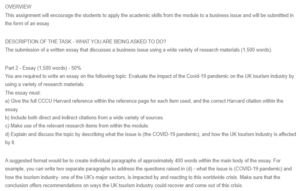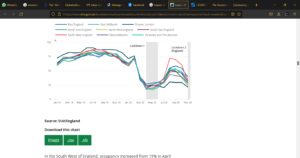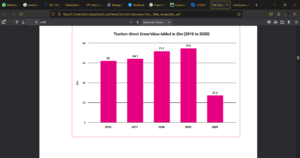Impact of the Covid-19 Pandemic on the UK Tourism Industry
The Covid-19 global pandemic started in 2020. It hit the world and paralyzed most businesses, including those in the tourism sector (UNWTO, 2020; Zenker & Kock, 2020). This interference was not only felt in the United Kingdom but also in other parts of the world (Abbas, Mubeen, & Lorember, 2021). While focusing on the UK, it is essential to note that tourism in the country is a significant sector (Department for Digital, Culture, Media & Sport, 2021, p.11). It provides jobs, spurs growth in other sectors, and generates considerable revenue. In 2018, the travel and tourism industry in the United Kingdom contributed at least 6.7 percent to the country’s Gross Domestic Product (GDP) (Roberts, 2021). The occurrence of COVID-19 in 2020 affected this GDP contribution by reducing it significantly. The key issues that led to this negative effect included restrictions on travel, which resulted in a lower turnover in the sector. The restrictions occurred both within the United Kingdom and globally. Thus, visitors could not enter the country for a significant period or leave for tourism. Subsequent lockdowns in November 2020 and January 2021 also affected the tourism sector further (Rahman & Gazi, 2021). The COVID-19 pandemic affected the tourism industry negatively by reducing the inflow of visitors, expenditure, and loss of employment.
Impact of Covid-19
Reduced Travel
Reduced travel affected the number of passengers that arrived in London by air monthly. The number of travelers reduced from 6,804,900 to 112,300 between February and April 2020. The decline reached 98.3 percent. According to the Civil Aviation Authority, the traffic of international passengers within UK airports reduced to 1.9 percent. The traffic recovered and peaked at 36.7 percent in August, then fell again due to the heightened restrictions (Roberts, 2021). The number of domestic passengers using air also reduced albeit slowly. Both domestic and international air passenger traffic was lowest between May and June. The data obtained from the Advanced Passenger Information showed that the number of international passengers declined constituted 56.5 percent of British nationals.
In addition, similar trends were observed in road traffic. Getlink, which operates Eurotunnel, confirmed that only 19,862 passenger vans in April 2020 used the tunnel. In April 2019, at least 227,393 vehicles used the tunnel. The cars included motorcycles, caravans, coaches, vehicles pulling trailers, and camping vans. The decrease was estimated to be 91.3 percent (Roberts, 2021). The reduction in passenger vehicles is synonymous with the decline in air traffic. The domestic and international air passengers are the people who use the tunnel. Thus, a reduction in their volume is likely to affect other forms of transport. This means that the effects trickled down to other supporting sectors of the tourism industry, such as food and beverage service, as well as accommodation.
Low Room Occupancy
Low room occupancy was recorded in various regions of England. As fewer visitors had access to the country, the hotels and hospitality establishments offering accommodation were not spared from the effect (Rahman & Gazi, 2021). Besides, few people spent time in the hotel rooms since the conferences and other events surrounding tourism were non-existent. At the pandemic’s start, the occupancy in hotel rooms dropped sharply in all English regions. West Midlands had a room occupancy of 17 percent in April 2020 and 71 percent in 2019, the same month. That decline confirms a significant drop that was a result of Covid-19. The various regions recovered at different rates. Greater London’s recovery was the slowest because only 20 percent of its rooms were occupied in July 2020, while 90 percent of the same rooms were occupied in July 2019. The process of recovery is shown in image one below.
Image 1: Percentage of available rooms occupied, monthly
The lack of both domestic and international tourists explains the low rates of occupancy. As the inflow of visitors from other regions reduced, the income that the accommodation aspect of tourism generates decreased as well.
Decline of Turnover
The reduction of tourists and tourism-related activities significantly impacted the turnover. Image two below shows that the Tourism-direct Gross value added in 2020 reduced substantially after rising gradually between 2016 and 2019. The turnover within the tourism industry was lowest in May 2020. The main elements of the sector that saw the most significant decline were travel agency operators and accommodation. During the initial lockdown in the nation, the two sectoral areas’ turnover dropped to 9.3 percent of the February levels during the month of May. The revenue reduced drastically based on the region-by-region expenditure; in the second half of 2019, the expenditure was 25,086,000 GBP and 14,746,000 GBP in 2021’s second half (Roberts, 2021).
Image 2: Tourism-direct Gross Value Added
Northeast England recorded the lowest expenditure during the two years’ halves, while London had the highest expenditure. In total, the tourism expenditure dropped by 10.5 million GBP to approximately 4 billion GBPs from the second half of 2019 to 2021 (Statista, n.d). Reduced expenditure in the tourism industry’s different elements culminated in a low national GDP (UNCTAD, 202, p.3). Furthermore, the country’s significantly low rate of employment due to the pandemic reduced the amount of disposable income that citizens from Great Britain and other nations could splurge on tourist attractions (Statista, 2021). Spending was reduced as individuals were keener on their financial discipline due to the uncertainty that COVID-19 brought about (Barua, 2021). This scenario further explains the lack of significant spending among individuals in the tourism industry, as it had been observed in 2019.
Reduced employment
The labor market was not spared as the pandemic ravished other sectors such as healthcare alongside the tourism industry (Jobvite, 2021, p.2). Reduced employment was witnessed in the sector more than in other sectors because it depends on visitors from other countries to a more significant proportion. The accommodation sector that was hit hardest regarding expenditure had the lowest employment. A drop in employment reached at least (21.5) percent.
Furthermore, the reduction of economic activities led to surplus labor. The employees experienced a reduction in working hours, permanent layoffs, temporary furloughs, and less pay (Allas, Canal, & Hunt, 2020). The individuals who occupy the lowest-paying positions are exposed to the greatest risk of losing their jobs. As the inflow of visitors from other regions reduced, the income that the accommodation aspect of tourism generates decreased as well. Employees such as waitstaff, stewards, bar staff, and kitchen assistants were faced with the greatest risk of losing their livelihoods (UNWTO, 2020). The hospitality establishments could not sustain the large numbers of workers when the volume of business had dropped significantly. Therefore, they had to let go of the non-essential employees whom they could no longer compensate (Behsudi, 2020).
Conclusion
The entire COVID-19 pandemic affected the tourism industry negatively by reducing the inflow of visitors, expenditure, and loss of employment. The process of recovery is expected to last till 2025. Achieving tourism expenditure, visitors, and GDP contribution recorded in 2019 requires government and interagency collaboration. The government must ensure restrictions are lifted appropriately for safe opening to visitors. In addition, it is paramount to prioritize the health of consumers and sector players even when pursuing business improvement.
Further, it is wise to start with inbound or local tourism and build up gradually. The need to support businesses in the sector exists since most players have succumbed to the pressure from the pandemic. Demand stimulation in areas and regions with the worst performance during the pandemic is essential, and this should increase the level of revenue obtained from business transactions with tourists.
Moreover, the government should also collaborate with players in the private sector. Tourism does not operate in isolation, and it is dependent on transport and infrastructure systems. It stimulates the local economies and promotes the growth of regions. Therefore, the government cannot ignore these players and their role in ensuring successful tourism activities. As already established, tourism is a significant contributor to the country’s GDP, which means that its failure could cost the country significant amounts of financial resources. There is an urgent need to restructure the sector before 2025 and have it on its feet again. Failure to take this initiative will lead to sustained adverse effects from COVID-19 as they are prolonged over an extended period.
References
Abbas, J., Mubeen, R., & Lorember, P. T. (2021). Exploring the impact of COVID-19 on tourism: transformational potential and implications for a sustainable recovery of the travel and leisure industry. Current Research in Behavioral Sciences, 2(100033). doi:https://doi.org/10.1016/j.crbeha.2021.100033
Allas, T., Canal, M., & Hunt, V. (2020). COVID-19 in the United Kingdom: Assessing jobs at risk and the impact on people and places. McKinsey Insights.
Barua, A. (2021). A spring in consumers’ steps: Americans prepare to get back to their spending ways. Retrieved from Deloitte: https://www2.deloitte.com/us/en/insights/economy/us-consumer-spending-after-covid.html
Behsudi, A. (2020). Tourism-dependent economies are among those harmed the most by the pandemic. Retrieved from https://www.imf.org/external/pubs/ft/fandd/2020/12/impact-of-the-pandemic-on-tourism-behsudi.htm
Delaney, H. (2019). Zappos gives new employees 4 weeks to decide if it’s a good fit — and lets them quit with pay if not. Their head of HR explains how this policy has helped them save money and hire great people.
Department for Digital, Culture, Media & Sport. (2021). The Tourism Recovery Plan.
Jobvite. (2021). 2021 Healthcare Recruiting Trends.
Rahman, M. K., & Gazi, A. I. (2021). Effect of Covid-19 pandemic on tourist travel risk and management perceptions. PLOS One, 16(9). doi:https://doi.org/10.1371/journal.pone.0256486
Roberts, D. (2021). Coronavirus and the impact on the UK travel and tourism industry. Retrieved from https://www.ons.gov.uk/businessindustryandtrade/tourismindustry/articles/coronavirusandtheimpactontheuktravelandtourismindustry/2021-02-15
Statista. (2021). Impact of the coronavirus (COVID-19) pandemic on total domestic tourism spending in Great Britain in 2020, with a forecast for 2021. Retrieved from https://www.statista.com/statistics/1255947/coronavirus-impact-domestic-travel-spending-britain/
Statista. (n.d). Forecast impact of the coronavirus (COVID-19) pandemic on total tourism expenditure in England in 2nd half 2021, by region. Retrieved from Statista: https://www.statista.com/statistics/1256657/forecast-covid-19-impact-on-tourism-expenditure-by-region-england/
UNCTAD. (2021). COVID-19 and Tourism: An Update.
UNWTO. (2020). Tourism and coronavirus disease (COVID-19). Retrieved from www.unwto.org/tourism-covid-19-coronavirus
UNWTO. (2020). Tourism and COVID-19 – unprecedented economic impacts. Retrieved from UNWTO: https://www.unwto.org/tourism-and-covid-19-unprecedented-economic-impacts
Zenker, S., & Kock, F. (2020). The coronavirus pandemic–A critical discussion of a tourism research agenda. Tourism management, 81, 1-14.
ORDER A PLAGIARISM-FREE PAPER HERE
We’ll write everything from scratch
Question
OVERVIEW
This assignment will encourage the students to apply the academic skills from the module to a business issue and will be submitted in the form of an essay

Impact of the Covid-19 Pandemic on the UK Tourism Industry
DESCRIPTION OF THE TASK – WHAT YOU ARE BEING ASKED TO DO?
The submission of a written essay that discusses a business issue using a wide variety of research materials (1,500 words).
Part 2 – Essay (1,500 words) – 50%
You are required to write an essay on the following topic: Evaluate the impact of the Covid-19 pandemic on the UK tourism industry by using a variety of research materials.
The essay must:
a) Give the full CCCU Harvard reference within the reference page for each item used, and the correct Harvard citation within the essay.
b) Include both direct and indirect citations from a wide variety of sources.
c) Make use of the relevant research items from within the module.
d) Explain and discuss the topic by describing what the issue is (the COVID-19 pandemic), and how the UK tourism industry is affected by it.
A suggested format would be to create individual paragraphs of approximately 400 words within the main body of the essay. For example, you can write two separate paragraphs to address the questions raised in (d) – what the issue is (COVID-19 pandemic) and how the tourism industry- one of the UK’s major sectors, is impacted by and reacting to this worldwide crisis. Make sure that the conclusion offers recommendations on ways the UK tourism industry could recover and come out of this crisis.



